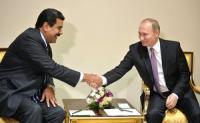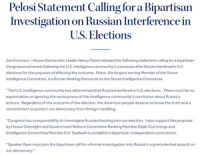-
Time to oust the Venezuelan dictator

The four-month effort by the last democratic branch of government in Venezuela - the National Assembly - to peacefully remove the Venezuelan dictator, Nicolas Maduro, has not succeeded. It is time for the major democratic powers around Venezuela - Colombia, Brazil and the United States - to militarily intervene to end the dictatorship.
-
-
“A lot of people are saying”: Conspiracies without theories
Russell Muirhead and Nancy L. Rosenblum are professors of government at, respectively, Dartmouth and Harvard. A few years ago, they found themselves, in their words, “startled into thought.” Yes, they knew, crazy ideas were a fixture of American life. But not this crazy. “The subject required more detailed and thoughtful interpretation,” the two write at the beginning of A Lot of People Are Saying: The New Conspiracism and the Assault on Democracy. Elizabeth Kolbert writes in the New Yorker that among the differences between “classic” conspiracy theories and the new conspiracism is their constituencies. Historically, Muirhead and Rosenblum maintain, it’s been out-of-power groups that have been drawn to tales of secret plots. Today, it’s those in power who insist the game is rigged, and no one more insistently than the so-called leader of the free world.
-
-
Facebook removes more pages, accounts linked to “inauthentic” Russian operators

Facebook said it has removed more pages and accounts that are believed to have originated in Russia and were involved in “coordinated inauthentic behavior.”
-
-
Agents of deceit: Russian disinformation institutions and actors

There is a burgeoning Western literature on Russian policy and practice in disinformation, but very little of it has detailed and reliable material about the government agencies and affiliated actors that promote it. A new, detailed report investigates the institutions and actors involved in Russian disinformation.
-
-
Venezuela’s rebellion that wasn’t
Venezuelan interim President Juan Guaidó took a big gamble last Tuesday when he stood outside La Carlota air base in Caracas at dawn and called on the military to drop its allegiance to dictator Nicolás Maduro. The call to action provoked street demonstrations across the country, but the plan fizzled. Mary Anastasia O’Grady writes in the Wall Street Journal that “The opposition would have more leverage if it could end the occupation of the country by Cuba, Russia, and Iran. When that happens Mr. Maduro loses his godfathers. But thus far the U.S. and its regional allies have given this axis of evil little incentive to withdraw. On Friday President Trump even played down Moscow’s role in Venezuela after a long phone call with Vladimir Putin. That’s good news for Mr. Maduro, who last week was reportedly giving polygraph tests to military officers he suspected of betraying him. Whether he has any real power, or ever did, remains a question.”
-
-
The Russia investigation will continue
Special Counsel Robert Mueller’s Russia probe is over, but the FBI is almost certain to continue its counterintelligence investigation into Russian espionage efforts related to the 2016 election. The FBI will continue to search for Americans working on behalf of the Kremlin. John Sipher writes in The Atlantic that the inability to establish that the Trump campaign conspired in a “tacit or express” agreement with the Russian government is not surprising. Most espionage investigations come up empty unless and until they get a lucky break. That does not mean there was no espionage activity in relation to the 2016 election. Every previous Russian political-warfare campaign was built on human spies. Russian “active measures”—propaganda, information warfare, cyberattacks, disinformation, use of forgeries, spreading conspiracies and rumors, funding extremist groups and deception operations—rely on human actors to support and inform their success. Counterintelligence professionals must doubt that Russia could have pulled off its election-interference effort without the support of spies burrowed into U.S. society or institutions.
-
-
DoD defends U.S. intelligence gathering in Venezuela
Acting U.S. Defense Secretary Patrick Shanahan on Friday defended U.S. intelligence gathering on Venezuela after U.S.-backed opposition leader Juan Guaido’s effort to inspire mass military defections earlier in the week fell short. Also on Friday, following an hour-long phone conversation with Russian president Vladimir Putin, President Donald Trump appeared to reject the assessments by the U.S. intelligence community about the Russian role and goals in Venezuela, and the blunt statements by Secretary of State Mike Pompeo and National Security Adviser John Bolton about Russia’s involvement in Venezuela in support of the besieged incumbent Nicolas Maduro.
-
-
Russia’s unrelenting attacks on the U.S. justice system
Russia’s broad campaign against liberal democracies shows no signs of abating. Information operations targeted against democratic institutions provide an incredibly high return on investment for the Kremlin. The U.S. justice system is under attack as part of a long-term Russian effort to undermine the appeal of democracy and weaken the West. Using multi-platform disinformation operations, Kremlin-backed operatives work to exacerbate existent divisions within populations and increase overall mistrust of and paranoia about democratic institutions.
-
-
Russia’s long game: Paralyze Europe’s ability to act in its own self-interest
With the European parliamentary elections approaching in less than a month’s time, Russia’s persistent disinformation campaign to subvert and undermine Europe’s democratic institutions is a source of growing worry. Russia is playing a long game in Europe: its objective is not merely to influence the outcome of any particular election, but rather to broadly subvert the efficacy of Europe’s democratic institutions, fuel widespread social fragmentation and mistrust, and ultimately paralyze Europe’s ability to act in its own self-interest and to defend our values.
-
-
Christchurch-style terrorism reaches American shores
In wake of the attack at Chabad synagogue of Poway, California, it is important to examine digital communications surrounding the shooting and what they suggest about future terrorist activity.
-
-
Anti-Semitism on the rise around the world
The authors of a new report on anti-Semitism around the world say that the most disturbing finding identified in 2018 is the sense of insecurity prevalent among Jews and confirmed by surveys. Jews do not feel an integral part of society anymore and sometimes they even sense a state of emergency. Anti-Semitism is mainstreaming, even normalized as a constant presence, in the public as well as in the private sphere. A rise of 13 percent in the number of major violent anti-Semitic incidents was registered; thirteen Jews were murdered.
-
-
Labour in fresh anti-Semitism row over Corbyn endorsing book about Jews controlling banks, press
In a fresh row over anti-Jewish sentiments in the British Labour Party, leader Jeremy Corbyn has been slammed for writing the foreword to a recent edition of a century-old book which contains overtly anti-Semitic tropes and conspiracy theories.
-
-
Influence operations in the digital age
Influence operations in the digital age are not merely propaganda with new tools. They represent an evolved form of manipulation that presents actors with endless possibilities — both benign and malignant. While the origins of this new form are semi-accidental, it has nonetheless opened up opportunities for the manipulation and exploitation of human beings that were previously inaccessible. Zac Rogers, Emily Bienvenue, and Maryanne Kelton write in War on the Rocks that digital influence operations, now conducted across the whole of society, indicate that we are only at the beginning of a new era of population-centric competition. With regard to propaganda, the fundamental distinction between the old and the new lies in the difference between participatory and passive forms of information consumption.
-
-
U.S. to designate Muslim Brotherhood a terrorist organization
Russia and China have recently touted their progress in developing hypersonic vehicles, which fly much faster than the speed of sound, which is 767 mph. Hypersonic missiles are rocket-boosted to high altitude and may be launched from land, sea or air. Over the past 60 years, U.S. interest in hypersonic vehicles has waxed and waned. Now it seems the U.S. is back in the hypersonic effort in a serious way.
-
-
Sri Lankan terrorists: An example of family-affiliated terrorism
A researcher recently published a book, Family Terror Networks, which addresses the phenomenon of family-linked terrorism, offering insight into the terrorist attacks in Sri Lanka, which killed nearly 300 people and injured more than 500 others and included attackers and cell members from several family terror networks, including two sets of brothers, as well as a husband and wife.
-
More headlines
The long view
Factories First: Winning the Drone War Before It Starts
Wars are won by factories before they are won on the battlefield,Martin C. Feldmann writes, noting that the United States lacks the manufacturing depth for the coming drone age. Rectifying this situation “will take far more than procurement tweaks,” Feldmann writes. “It demands a national-level, wartime-scale industrial mobilization.”
No Nation Is an Island: The Dangers of Modern U.S. Isolationism
The resurgence of isolationist sentiment in American politics is understandable but misguided. While the desire to refocus on domestic renewal is justified, retreating from the world will not bring the security, prosperity, or sovereignty that its proponents promise. On the contrary, it invites instability, diminishes U.S. influence, and erodes the democratic order the U.S. helped forge.
Fragmented by Design: USAID’s Dismantling and the Future of American Foreign Aid
The Trump administration launched an aggressive restructuring of U.S. foreign aid, effectively dismantling the United States Agency for International Development (USAID). The humanitarian and geopolitical fallout of the demise of USAID includes shuttered clinics, destroyed food aid, and China’s growing influence in the global south. This new era of American soft power will determine how, and whether, the U.S. continues to lead in global development.
Water Wars: A Historic Agreement Between Mexico and US Is Ramping Up Border Tension
By Natasha Lindstaedt
As climate change drives rising temperatures and changes in rainfall, Mexico and the US are in the middle of a conflict over water, putting an additional strain on their relationship. Partly due to constant droughts, Mexico has struggled to maintain its water deliveries for much of the last 25 years, deliveries to which it is obligated by a 1944 water-sharing agreement between the two countries.
How Disastrous Was the Trump-Putin Meeting?
In Alaska, Trump got played by Putin. Therefore, Steven Pifer writes, the European leaders and Zelensky have to “diplomatically offer suggestions to walk Trump back from a position that he does not appear to understand would be bad for Ukraine, bad for Europe, and bad for American interests. And they have to do so without setting off an explosion that could disrupt U.S.-Ukrainian and U.S.-European relations—all to the delight of Putin and the Kremlin.”
How Male Grievance Fuels Radicalization and Extremist Violence
By Haily Tran
Social extremism is evolving in reach and form. While traditional racial supremacy ideologies remain, contemporary movements are now often fueled by something more personal and emotionally resonant: male grievance.
